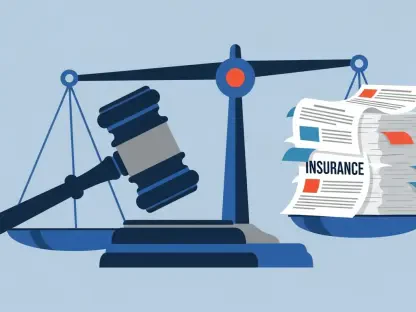The integration of artificial intelligence (AI) into modern workplace systems, particularly within human resources (HR) functions, has revolutionized how businesses operate by enhancing efficiency and slashing operational costs. However, beneath this promise of progress lies a growing web of legal and financial risks that can jeopardize even the most robust corporations. Biased algorithms, regulatory scrutiny, and escalating litigation costs are just a few of the challenges emerging in this tech-driven landscape. As companies increasingly rely on AI for hiring and employee management, the potential for discrimination and noncompliance with evolving laws becomes a pressing concern. This article explores the critical role of Employment Practices Liability (EPL) insurance as an essential safeguard, protecting businesses from the unforeseen consequences of AI adoption. It delves into the complexities of this new corporate frontier, offering insights into why such coverage is no longer optional but a strategic necessity for survival.
Navigating the Risks of AI in Human Resources
The allure of AI in HR lies in its ability to streamline processes like recruitment and performance evaluation, minimizing human error and bias in decision-making. However, the reality often paints a starkly different picture, as these tools can inadvertently perpetuate existing inequalities when trained on historical data riddled with systemic flaws. A striking example from 2023 in New York saw a company settle for $365,000 after its AI hiring system was found to discriminate against older candidates, exposing a critical vulnerability. With around 25% of U.S. organizations adopting AI for HR tasks by 2024, according to the Society for Human Resource Management, the scale of potential exposure is staggering. Companies now face not only legal repercussions but also significant reputational harm if these issues go unaddressed, underscoring the urgent need for proactive measures to mitigate such risks in an increasingly digitized workplace.
Beyond the technical pitfalls, the financial and ethical implications of AI-driven HR missteps are becoming impossible to ignore. When algorithms fail to account for diversity or fairness, the resulting lawsuits can drain corporate resources and erode public trust in a matter of months. The ripple effects extend to employee morale and retention, as workers grow wary of opaque systems that seem to prioritize efficiency over equity. Moreover, the pace of AI adoption often outstrips the ability of internal teams to fully understand or monitor these tools, leaving gaps in accountability that courts and regulators are quick to exploit. As litigation becomes more common, businesses must grapple with the reality that a single oversight in AI implementation could lead to multimillion-dollar penalties, making it clear that technological advancement without oversight is a gamble few can afford to take.
Regulatory Challenges in the AI Era
As AI reshapes HR practices, regulators are racing to keep pace, introducing a complex web of laws and guidelines that demand strict compliance from employers. The U.S. Equal Employment Opportunity Commission (EEOC) has placed AI-related discrimination at the forefront of its 2024–2028 Strategic Enforcement Plan, signaling a zero-tolerance approach to algorithmic bias. Meanwhile, states such as New York, Colorado, and California have enacted mandates for bias audits and transparency in AI-driven hiring processes, setting a precedent for accountability. These measures, coupled with broader protections like updated harassment guidelines and the Pregnant Workers Fairness Act, have significantly widened the scope of employer liability, creating a minefield of potential legal challenges for those unprepared to adapt to this shifting landscape.
Adding to the complexity, recent regulatory trends reveal a surge in litigation tied to noncompliance with emerging standards, particularly around pay transparency laws now active in 12 states. In Washington, for instance, class-action lawsuits over noncompliant job postings spiked by 40% in the current year, illustrating the tangible consequences of failing to meet these requirements. Employers are finding that ignorance of these evolving rules is no defense, as both federal and state authorities intensify oversight of workplace technologies. The financial burden of penalties, combined with the cost of legal defense, can be crippling, especially for mid-to-large corporations operating across multiple jurisdictions. Staying ahead of these regulations is not just a matter of legal obligation but a strategic imperative to avoid the devastating fallout of enforcement actions.
The Rising Importance of EPL Coverage
Once considered a peripheral product, EPL insurance has emerged as a vital shield for companies grappling with the legal fallout of AI integration in the workplace. As claims tied to algorithmic discrimination and regulatory breaches grow in complexity, insurers are adapting by tightening underwriting practices and, in some cases, raising premiums by up to 5%, as observed in 2024. High-risk industries, particularly those heavily reliant on AI tools, may face coverage exclusions or steeper costs, reflecting the uncertainty surrounding these emerging liabilities. A notable case from this year, where a company settled for $26 million over systemic underpayment of women and minorities, highlights the escalating financial stakes and the role of social inflation in driving larger jury awards, making EPL coverage indispensable.
The strategic value of EPL insurance extends beyond mere financial protection, offering a buffer against the reputational damage that often accompanies high-profile employment disputes. With insurers now scrutinizing AI usage during policy evaluations, companies are incentivized to refine their practices and ensure compliance with best standards to secure favorable terms. This shift in the insurance market underscores a broader recognition that the risks tied to AI are not fleeting but a permanent fixture of modern business. For corporations, investing in comprehensive EPL coverage is akin to building a firewall against the unpredictable costs of litigation, allowing them to innovate with confidence while safeguarding their bottom line against the inevitable legal challenges that arise in this dynamic environment.
Investment Perspectives on Workplace Risks
From an investor’s standpoint, the intersection of AI-driven workplace practices and legal risks presents both challenges and opportunities in identifying resilient businesses. Companies that proactively address EPL risks through regular AI bias audits, adherence to regulatory frameworks, and robust insurance coverage stand out as safer bets in a volatile market. Such diligence not only mitigates the likelihood of costly lawsuits but also signals a commitment to sustainable growth that appeals to stakeholders. Investors must look beyond short-term gains and prioritize firms that treat risk management as a core competency, as those unprepared for the legal complexities of AI adoption risk significant setbacks that could undermine long-term value.
Equally compelling is the growth trajectory of the EPL insurance market itself, projected to reach $4.94 billion by 2031, driven by the increasing demand for tailored solutions to AI-specific risks. Major insurers are expanding their offerings to address these unique challenges, creating a niche yet lucrative sector for investment. For those with a keen eye on market trends, this presents a chance to capitalize on a burgeoning industry while supporting the broader push for corporate accountability. Understanding how companies navigate these workplace risks, alongside the evolving role of EPL coverage, is essential for making informed decisions in a landscape where technology and liability are inextricably linked.
Safeguarding the Future of Business
Reflecting on the journey through AI-driven workplace challenges, it becomes evident that the corporate world stands at a pivotal moment where innovation and risk are two sides of the same coin. The pitfalls of biased algorithms have led to substantial settlements, while regulatory bodies tighten their grip with groundbreaking laws and enforcement actions. EPL insurance has proven itself as a linchpin in protecting businesses from the financial and reputational ravages of employment claims. Looking ahead, the path forward demands that companies not only embrace robust coverage but also invest in continuous monitoring of AI systems to ensure fairness and compliance. For investors, the focus shifts to backing enterprises that balance technological advancement with proactive risk strategies, while exploring opportunities in the expanding insurance market. This dual approach offers a roadmap to navigate the complexities of modern workplaces with resilience and foresight.









